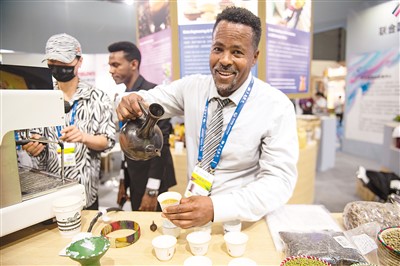China shares e-commerce development experience with African countries
During the recently concluded 2023 World Internet Conference Wuzhen Summit, an event was hosted to showcase the exemplary cases of building a community with a shared future in cyberspace.
One of the selected cases was the "Alibaba Digital County Partnering with International Trade Centre (ITC) to Support Digital Poverty Alleviation in African Developing Countries" from Chinese e-commerce giant Alibaba Group.
"In rural areas of China, we have been committed to leveraging platforms and digital capabilities to promote industrial development. From helping farmers sell agricultural products online to the likes of branding, marketing, supply chains, management, technology and talent cultivation, we have connected consumers and producing areas, and assisted farmers, companies, and rural entrepreneurs," Wen Jia, president of Public Affairs of Alibaba Group, said at the event.
Wen recalled that she considered introducing China's experience in driving rural revitalization through the application of digital technologies to Africa.
Alibaba's Digital County Project offered new packaging for Ethiopian coffee and optimized the supply chain, and online and offline marketing plans to facilitate the digital transformation of featured African products.

An exhibitor presents Ethiopian coffee during the third China-Africa Economic and Trade Expo in Changsha, central China's Hunan Province. (Xinhua/Sun Ruibo)
For example, packaging designers illustrated the processes of planting, picking, sorting, washing and roasting into different comics using local African color schemes and styles to convey the quality of Ethiopian coffee.
As a result, coffee beans from Ethiopia's highlands are transported to China and turned into drip bag coffee with refreshingly new packaging. On Chinese e-commerce platforms, this type of Ethiopian coffee enjoys great popularity among consumers. Nearly 20,000 bags of Ethiopian coffee were sold during a livestream on one night.
The coffee growers in Ethiopia didn't expect the price of their coffee beans to triple. Now they can use the additional income to purchase milk and clean drinking water, and pay for their children's tuition, among others.
For Chinese consumers, without the middleman, this type of Ethiopian coffee is still cheaper than other coffee products of similar quality. Last year, it was exhibited at the China International Import Expo (CIIE) and was promoted during China's "Double 11" online shopping festival.
This model is being promoted to more countries, industries and products.
"We are partnering with Alibaba, hoping to extend China's experience in rural revitalization to more developing countries in Africa, said Rob Kohlmann, senior trade facilitation adviser of the ITC, at the event.
In June 2022, the project organized a seminar for around 50 small and medium-sized enterprises (SMEs) from developing countries, including African countries, aiming to help more African entrepreneurs learn how to engage in e-commerce in China, and build brands of featured agricultural products.
"This was the first time for us to understand the development trends of China's consumer goods market. The training content was fantastic," said an entrepreneur from Uganda, who hoped that there would be more such training courses in the future for them to acquire more experience in the online marketing of agricultural products and better learn how to sell products to the Chinese market.
So far, over 250 African companies have moved their businesses to the international site of Alibaba. Rob Kohlmann said this cooperation model has yielded encouraging results, hoping to continue cooperation so that more African countries can benefit from China's experience in rural revitalization.
The project has also connected enterprises and African governments by holding meetings with ambassadors and recommending African products to the CIIE to help African SMEs.
In August 2022, the project initiated meetings with African ambassadors and officials from eight African countries—Mauritius, Mozambique, Madagascar, Ethiopia, Kenya, Zambia, Rwanda and Nigeria—to share their experiences in promoting rural revitalization through digitalization and jointly formulate training plans for African SMEs and agricultural companies to boost local e-commerce development.
Pamela Coke-Hamilton, executive director of the ITC, said she was very happy to see that the project has provided new development opportunities for African developing countries.
Photos
Related Stories
- Interview: World Media Summit to deepen understanding of China-Africa cooperation, says Ghanaian media executive
- China Unicom Global supports digital transformation in Tanzania
- Cassava thrives in deepening Sino-African agri cooperation
- China, Africa see bright prospect for comprehensive agricultural cooperation
- Chinese technology, expertise help advance Africa's digital transformation
- Kenya hosts China-Africa investment summit amid call for green transition
Copyright © 2023 People's Daily Online. All Rights Reserved.









